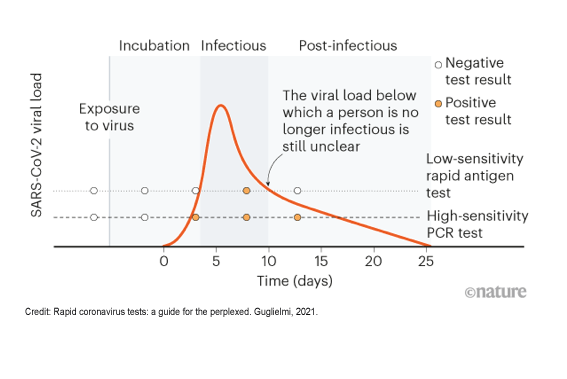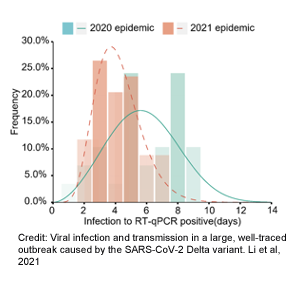Help! 🙋I’ve been exposed to COVID-19! 🙋 When should I get tested? Is test timing different for the Delta variant?
The short answer: Get tested at the right time and repeat if needed.
The details: The sweet spot for COVID-19 testing is 3-5 days after a known exposure, or when you begin to feel symptoms. Erring on the later side of this sweet spot reduces the chances that you are falsely reassured. If you’re negative, it’s wise to re-test in 2 days to be sure, especially if you still have symptoms or tested on the early side. This timeline is optimized for the delta variant, in which replication takes off a few days sooner than the original variant.
⏳ Here’s the TL;DR on why timing is everything, and how to get it right.
THE SCIENCE
🦠 After a COVID-19 exposure, the SARS-CoV-2 virus infects your cells and turns them into tiny factories that crank out millions of new viruses. The amount of virus in your body stays low for a few days, then shoots through the roof before gradually decreasing over a period of weeks.
🤒 Unfortunately, there is no way to know exactly when the virus will take off in YOUR body. The length of time the SARS-CoV-2 virus “incubates” varies from person to person and across variants. 📈See figure for a typical infection timeline.
🔬With the original strain of SARS-CoV-2, the first day of detectable virus (by PCR) was usually around 6 days after exposure. The time for symptoms to develop after exposure, known as the “incubation period” was similar (5-6 days).
🏎️ Things move more quickly with the rapidly replicating delta variant. The average time from exposure to PCR detection is just under 4 days, and symptoms soon follow.
‼️ It’s important to bear in mind that these numbers are averages, and can vary greatly from person to person. Some cases of the Delta variant are detectable a mere 2 days after exposure, but most take longer. Only a modest fraction of Delta variant cases take more than 5 days to detect. By contrast, with the original variant, testing at 5 days would still miss a significant chunk of cases. 📊 See figure for a comparison of 2020 (original COVID-19) and 2021 (Delta variant) timelines from infection to PCR detection.
PRACTICAL TIPS
😵 If you have symptoms, get tested ASAP! Virus levels typically peak within a few days of symptom onset, making it easy to detect your infection. It’s like shooting fish in a barrel! Test again in a few days if you initially tested negative and still have symptoms.
😷 If you were exposed but don’t have symptoms, the CDC recommends waiting 3-5 days to test. While your odds of detecting COVID-19 are solid at 3 days, they are even better at 5 days. The only downside of waiting 5 days is… the wait.
😟 If you’re feeling anxious, consider testing at 3 days for a sneak preview, either with PCR or a rapid test, then again on day 5. We know that patience is hard, but it’s worth it!
WHAT ABOUT RAPID ANTIGEN TESTS?
🧫 The sweet spot for PCR and rapid antigen tests is the same for the Delta variant. However, because PCR tests can detect lower levels of virus, they can catch infections slightly earlier, as virus levels shoot from low to high. Their high sensitivity also means that PCR tests can light up for weeks even after somebody is no longer infectious.
Remember that no matter when you test, you should follow the appropriate guidance while you wait for your results:
Dear Pandemic What to do if you are exposed to someone with symptoms of or confirmed COVID-19
Keep calm and test on!
With Love,
Those Nerdy Girls
Thanks again to Nerdy Girl Dr. Chana Davis (Fueled by Science) for tackling the thorny issues of testing in this series!
Figures:

Figure Credit: Rapid coronavirus tests: a guide for the perplexed. Guglielmi, 2021.

Figure Credit: Viral infection and transmission in a large, well-traced outbreak caused by the SARS-CoV-2 Delta variant. Li et al, 2021
Links:
ID society guidelines for COVID-19 testing
DP Links:
Do you have practical advice for families around testing for COVID-19?
Why are there so many tests for COVID-19? How do I know which one is best for me?
Should I take a COVID-19 rapid antigen test? Part 1 in a Series


